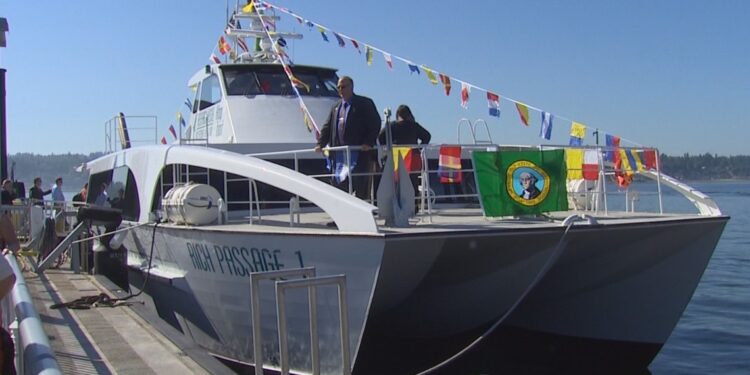Pierce County Executive Ryan Mello unveiled plans for an electric fast ferry service connecting Tacoma and Seattle in time for the 2026 FIFA World Cup, aiming to provide an alternative transportation option for the estimated 750,000 visitors expected in the region.
The proposed one-year pilot program would utilize the Artemis 29, a fully electric vessel accommodating 29 passengers with space for luggage and bicycles. Two vessels would operate eight daily round-trips between potential docking locations at Thea Foss Waterway and Ruston Way.
Travel times would range from 45 minutes to one hour depending on the final docking configuration. Mello emphasized the service’s appeal for international visitors seeking scenic transportation options.
“They’re not just coming for the World Cup, they’re coming to see this place and experience this place,” Mello said. “What better way to move around this beautiful part of the world than on the water?”
The $4 million pilot program has secured half its funding through local tourism revenue sources. Mello must raise an additional $2 million over the coming months, with the Port of Tacoma Commission invited to participate as founding sponsors during his recent presentation.
Community response has been positive, with residents expressing enthusiasm for alternatives to Interstate 5 congestion. “I will do anything to not drive on I-5,” said supporter Vicky. Mary Eversole added, “I think it’s fantastic. Any alternative transportation to cars, especially using the waterways.”
The proposal addresses regional transportation challenges that predate World Cup planning, as South Sound residents frequently commute between Pierce and King counties for work and recreation. Current options include driving on frequently congested I-5 or limited bus service.
Electric ferry technology aligns with Pierce County’s sustainability goals while potentially reducing carbon emissions from vehicle traffic between the metropolitan areas. The Artemis 29’s electric propulsion system represents emerging marine transportation technology being deployed in various coastal regions.
However, significant implementation challenges remain. The proposal requires regulatory approval, infrastructure development at docking sites, and completion of fundraising efforts. Additionally, vessel procurement and crew training must occur within the compressed timeline.
Mello acknowledged the ambitious nature of the timeline while expressing confidence in the project’s viability. The World Cup provides motivation for expedited implementation that might not otherwise exist for transportation infrastructure projects.
Success of the pilot program could influence longer-term regional transportation planning, potentially leading to permanent ferry service between Pierce and King counties beyond the World Cup period.
The proposal reflects growing interest in water-based transportation solutions as Puget Sound communities seek alternatives to increasingly congested roadway systems.







